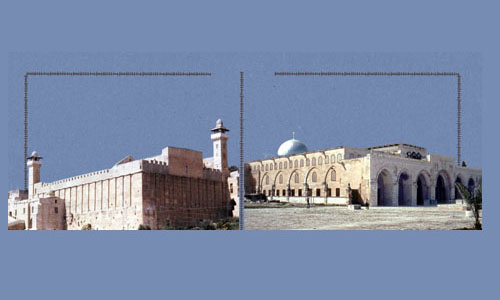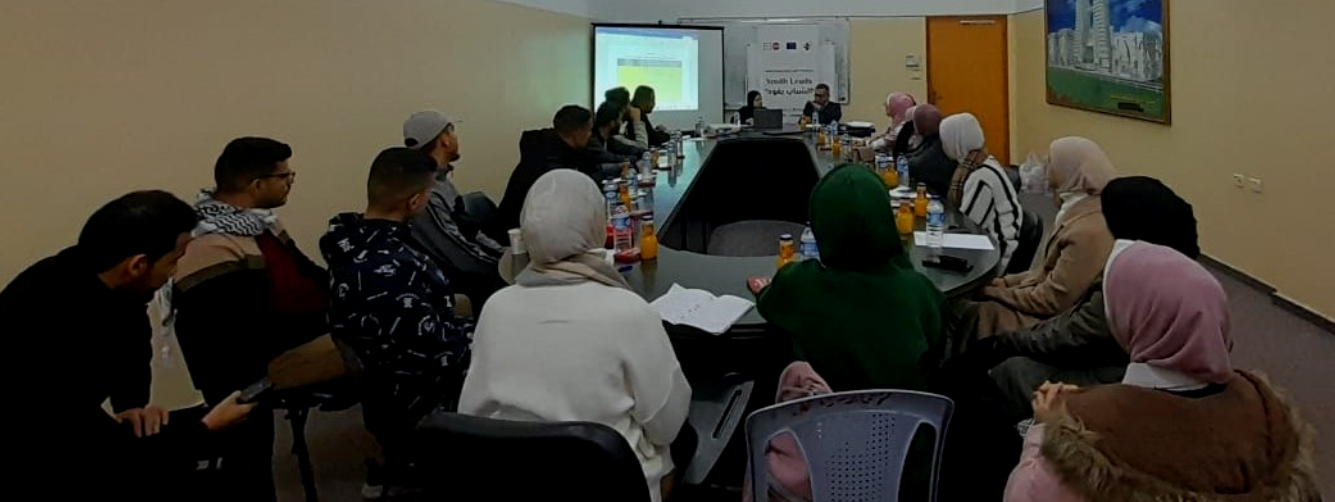
Ramallah – 31/3/2021 – Last week, MIFTAH held a special session to showcase and discuss policy papers on Israel’s city center and “Silicon Valley” plans for Jerusalem and also Israeli violations against the commercial and tourist sectors in Hebron’s old city. Data and information was collected by youth defenders in Jerusalem and Hebron as part of MIFTAH’s EU-funded project “Palestinian Youth as Human Rights Defenders”, implemented in Jerusalem, Hebron and the Gaza Strip.
MIFTAH Executive Director, Tahreer Araj opened the session by stressing on the importance of the project within the Palestinian context, maintaining it was a crucial tool for monitoring and documenting Israeli violations, which could help to contribute to promoting the efforts of civil society and rights organizations in exposing Israeli violations and crimes against the Palestinian people in international arenas. “For MIFTAH, this project is important in that it contributes to creating a community of Palestinian youth that is aware of its needs and has the ability to convey the Palestinian narrative to the world. In turn, this allows them to fight for a free and democratic rights-based society.”
Presentations
This was followed by a presentation of the findings regarding plans for Jerusalem’s city center, showcased by human rights defender, Mohammad Miqdad. He said this was a plan based on settlement expansion and aimed at Judaizing Jerusalem and impacting the social, economic and housing aspects of Jerusalemite lives. Miqdad explained that the plan expands over an area of 689 dunams in the most sensitive and vital regions of the city, with a long-term goal of taking control of the land and Judaizing Jerusalem including maintaining a Jewish majority in it. The plan also aims to “Israelize” the characteristics of Palestinian existence in Jerusalem and isolate it from its Jerusalem surroundings by fragmenting Palestinian neighborhoods in the city and increasing economic restrictions on its people. This, he concluded, would have a major impact on Jerusalemites in terms of limiting possibilities for housing options by not allowing additional construction, which is necessary for natural growth. Miqdad said ultimately, this would force a large number of people to look for housing outside Jerusalem. What’s more, he explained how Israeli authorities violate Jerusalemites’ right to housing and education and also undermine commercial activity in and around the Old City in addition to absenting the Palestinian cultural and heritage identity of the city.
In response to this plan, recommendations included increasing the budget of the Jerusalem Affairs Ministry and increasing financial support for educational facilities; offering direct support to civil society institutions and merchants, reviving the role of the international community through advocacy and lobbying campaigns, filing complaints against Israel in international forums such as UNESCO and the ICC, and calling on signatories of the Fourth Geneva Convention to guarantee its application in the occupied territories.
Meanwhile, Nadine Tamimi and Marwa Shweiki, from the human rights defenders group in Hebron, broached Israeli policies targeting the commercial and tourist sectors in Hebron’s old city and how this is linked to the settlement presence in Hebron, where there are 22 settlements, 15 settlement outposts and four industrial settlements in which 19,000 settlers live in total.
The defenders pointed to Israeli army and settler measures against old city residents and international activists who are prohibited from entering certain areas such as “Dabuya”, the vegetable market and Shuhada Street. Israeli authorities are also zeroing in on the Ibrahimi Mosque and the religious and historical sites inside the Old City, which would have been thriving tourist sites if were not for the violations of Israeli occupation forces and settlers.
Regarding tourism in Hebron’s old city, the policy paper showed that Israeli authorities attract foreign tourists to the area behind the Ibrahimi Mosque, which has resulted in a decline in tourist activity in Palestinian markets. This is compounded by the fact that there are nearly 100 Israeli military checkpoints inside the old city alone.
The policy paper included several recommendations, including raising the level of tourist and commercial awareness in Hebron’s old city, reviving marketing and tourist media, calling on the Palestinian Ministry of Tourism to formulate a national plan for the old city, signing twin city agreements between the Hebron municipality and municipalities around the world, calling on UNESCO to protect the old city and revitalizing old city stores through virtual trading by the city’s Chamber of Commerce.
This was followed by interventions pertaining to the two policy papers including: reviving and amplifying legal interventions by rights and civil society institutions that follow up on the plans for Jerusalem’s city center and Silicon Valley; urging the Jerusalemite community and all institutions working in Jerusalem to increase objections to this plan; and calling on all local, Arab and international parties to increase pressure on Israel and revive the Palestinian and Arab culture, literature and identity of Jerusalem.
An important recommendation was made for Hebron’s old city, which was to establish a coordinating body among all parties working in this area to encourage the return of citizens and institutions to the old city. This could be achieved through offering certain incentives and reviving the work of the various ministries in the old city.
In this regard, deputy governor of Hebron, Rafiq Al Jaabrai called on all institutions in the old city to participate in a meeting to follow up on the recommendations from the session.
The meeting was closed by MIFTAH’s project coordinator for youth as human rights defenders, Waad Qannam who confirmed the important role of these youth defenders in Jerusalem, Hebron and the Gaza Strip in documenting Israeli violations. He cited the lobbying and advocacy campaigns at the international level that resulted from the project and the production of policy papers by the youth defenders, which include practical interventions at the local and international level towards the protection of human rights. Another outcome of this session was promoting coordination between Jerusalemite rights groups working to combat Israel’s plan in the city center and to also establish a coordinating council for rights institutions working in the old city of Hebron under the auspices of the Hebron governor.








